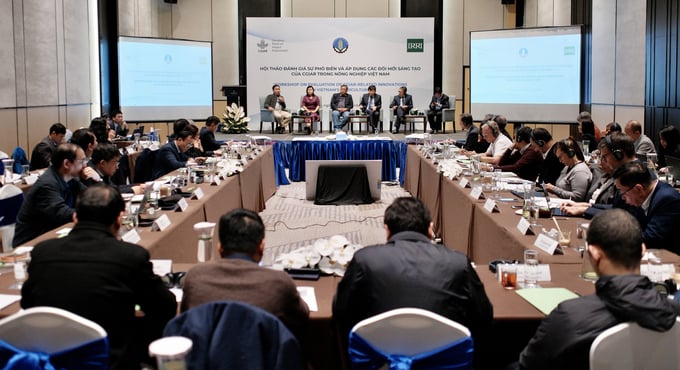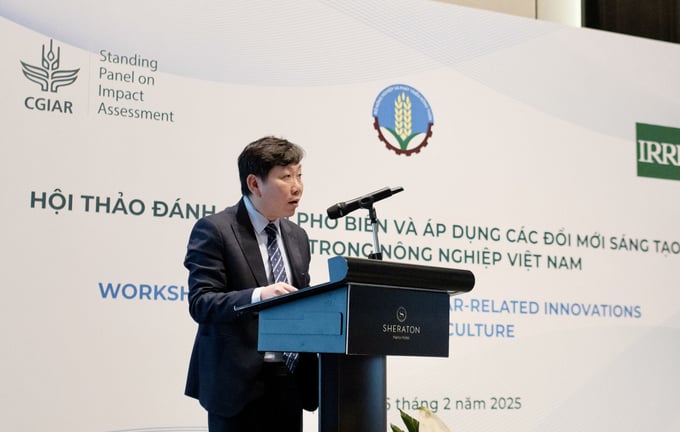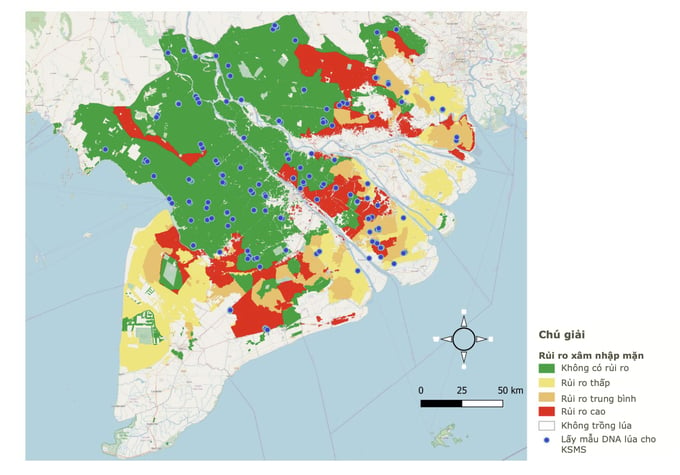December 1, 2025 | 10:45 GMT +7
December 1, 2025 | 10:45 GMT +7
Hotline: 0913.378.918
December 1, 2025 | 10:45 GMT +7
Hotline: 0913.378.918

Workshop to assess the dissemination and application of CGIAR innovations in Vietnamese agriculture on February 26 in Hanoi. Photo: Quynh Chi.
On February 26, the International Cooperation Department (Ministry of Agriculture and Rural Development), in collaboration with the International Rice Research Institute (IRRI) and the CGIAR Standing Panel on Impact Assessment (SPIA), organized a workshop to evaluate the dissemination and application of CGIAR innovations in Vietnamese agriculture.
During the workshop, SPIA representatives presented their assessment of CGIAR research outreach among farmers. According to the SPIA Vietnam 2024 Report, CGIAR initiatives in the agricultural sector have provided sustainable livelihoods for 3.7 to 3.9 million farming households across Vietnam.
SPIA Chair Travis Lybbert stated that SPIA’s primary role is to review and analyze evidence on the impact of CGIAR's research investments. In Vietnam, scientific data collected by international researchers has demonstrated high efficiency. Many research findings have been recognized, standardized, and incorporated into practical handbooks for agricultural extension officers and farmers by the Ministry of Agriculture and Rural Development (MARD).
Visualizing these findings with a map of CGIAR system reports, Dr. Lybbert explained that the red areas over Vietnam indicate a high level of data collection. With nearly 200 documented results, this data will enable international partners to better understand agricultural practices in Vietnam.
Vietnam is among the first countries where CGIAR has conducted investment data analysis for the 2019–2024 period. Encouraged by positive outcomes, SPIA plans to expand research efforts in Vietnam and establish a new research team over the next five years.
“SPIA will share all collected data and evidence with policymakers, providing decision-makers with the most comprehensive and effective insights into international investments,” Mr. Lybbert emphasized.
Initial findings reveal that over the past 20 years (2003–2023), CGIAR has developed 79 initiatives and contributed to 30 policy advancements across six key areas: aquaculture and fisheries, livestock, digital tools, conservation, veterinary and health, and mechanization and crop production. Of these, 19 major agricultural initiatives have been widely adopted by Vietnamese farmers.
The research team collaborated with the General Statistics Office, utilizing data from the Household Living Standards Survey to assess the extent of CGIAR’s outreach.
Speaking at the event, Dr. Nguyen Do Anh Tuan, Director of the International Cooperation Department (MARD), emphasized: “Today’s workshop is a significant opportunity to evaluate the impact of CGIAR’s innovations in Vietnam over the past period. From this, we can analyze new opportunities, discuss strategies, and propose solutions to scale up the application of these innovations.”

Dr. Nguyen Do Anh Tuan commended the quality of the scientific data provided by CGIAR, highlighting its importance for decision-making process. Photo: Quynh Chi.
As part of the workshop, a discussion session was held to gather additional insights from stakeholders, helping SPIA refine its assessment framework for the next phase.
Dr. Tran Cong Thang, Director of the Institute of Policy and Strategy for Agricultural and Rural Development (IPSARD), noted that CGIAR's impact at the macro level is evident through the institutionalization of scientific initiatives. Key examples include Vietnam’s strategic vision for ecological agriculture, the Prime Minister’s Decision No. 300 approving the National Action Plan for a transparent, responsible, and sustainable food system, and policies promoting afforestation and forest protection.
Looking ahead to the 2025–2030 period, Vietnam will expand initiatives under the Project for sustainable development of one million hectares of high-quality, low-emission rice in the Mekong Delta. Preparations for the project are nearly complete, with various policy measures in place to encourage straw collection, strengthen production linkages, improve access to agricultural credit, and standardize sustainable rice cultivation practices.
Dr. Thang emphasized: “To effectively monitor and evaluate these innovations, the research team must establish baseline data every five years. This approach will allow us to systematically assess the strengths and weaknesses of scientific and policy interventions.”

The Climate-Smart Mapping and Adaptation Planning (CS-MAP) provides managers with crucial insights to optimize cropping schedules. Photo: CGIAR-SPIA.
Dr. Le Thanh Tung, former Deputy Director of the Department of Crop Production (MARD) and Permanent Vice President and General Secretary of the Rice Industry Association (VIETRISA), emphasized that in addition to policies and cultivation processes, it is essential to consider the growth cycle of rice plants.
He explained that aligning management and production practices with the life cycle of rice crops would enhance the quality of Vietnamese rice. “Minimizing declines in rice quality and reducing post-harvest losses is key to maintaining household incomes,” Dr. Tung noted.
Associate Professor Dr. Dao The Anh, Deputy Director of the Vietnam Academy of Agricultural Sciences (VAAS), pointed out that SPIA’s previous assessments have been relatively limited, primarily focusing on specific stages of agricultural production.
To align with the evolving socio-economic landscape, he recommended that SPIA broaden the scope of its research to provide a more comprehensive evaluation of policy impacts.
“For instance, we need to assess how the transition to ecological agriculture influences livelihoods, the environment, and social awareness. In addition to sharing assessment data, there should also be more in-depth discussions to ensure the data is effectively utilized and applied,” Dr. Dao The Anh suggested.
Translated by Quynh Chi

(VAN) The inevitable path forward is to reorganize production along the value chain, utilizing cooperatives as the core, enterprises as the driving force, and farmers as the central subjects.

(VAN) On November 28, Minister Tran Duc Thang, together with China's Minister of Agriculture and Rural Affairs Han Jun, chaired the 2nd meeting of the Viet Nam - China Agricultural Cooperation Committee.

(VAN) Forest carbon credits are only accepted when they ensure absolute environmental integrity, additionality, permanence, and transparency.

(VAN) Viet Nam partners with Beijing on controlling air pollution, cross-regional management, high-tech monitoring and relocating polluting facilities.

(VAN) With a USD 50 million investment, Australia is partnering with Viet Nam to operate its first public electric bus fleet and develop a nationwide EV charging network.

(VAN) On November 28, in Beijing, Minister Tran Duc Thang met Minister of Ecology and Environment of China Huang Runqiu, to share experience on environmental protection.
/2025/11/28/0950-2-120557_751.jpg)
(VAN) The recent flood spell in the South Central region clearly reflects the characteristics of natural disasters in 2025, which are compound, prolonged, and amplified.